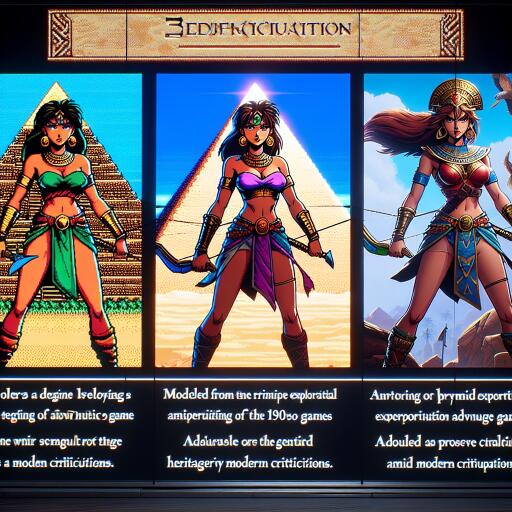Crystal Dynamics’ Bold Decision: Preserving Legacy Amidst Controversy in Tomb Raider 1-3 Remastered
In a move that highlights their commitment to both preserving gaming history and acknowledging past missteps, Crystal Dynamics has taken a nuanced approach with the release of Tomb Raider 1-3 Remastered. This collection, which includes the first three games of the iconic Tomb Raider series, aims to maintain the original content, despite its outdated and offensive racial and ethnic stereotypes. This article delves into the complexities of this decision and explores the various enhancements made by Aspyr to bring these classic games to modern audiences.
Understanding the gravity of these harmful depictions, Crystal Dynamics has introduced a warning into the remastered collection. This disclaimer candidly addresses the presence of content rooted in racial and ethnic stereotypes, clarifying that such portrayals are both deeply troubling and contrary to the company’s current values. It’s a bold stance, opting to retain these elements unaltered, while hoping that this transparency can foster dialogue and awareness around the issues.
While Crystal Dynamics has remained somewhat vague regarding the specific content under scrutiny, it’s speculated that the portrayal of Pacific Island natives in Tomb Raider 3 is among the concerns. In this instance, the depiction of natives in an uncivilized, antagonistic manner has been criticized for reinforcing outdated and harmful cultural stereotypes. This decision to face such issues directly, rather than erasing them, marks a significant step in acknowledging past mistakes and promoting understanding.
On the technical front, Aspyr has been tasked with updating these legendary adventures for current gaming platforms. Scheduled for a February 14 release, the remastered collection not only comprises Lara Croft’s initial trio of expeditions but also integrates all additional content, including expansions and secret levels. A notable enhancement is the introduction of adjustable controls and graphics settings, enabling players to tailor their experience to their own preferences and the capabilities of their respective gaming systems.
Moreover, this remastered trilogy has undergone various updates aimed at modernizing the experience. Aspyr’s efforts cover improvements in performance and compatibility, ensuring that the games run smoothly across a range of platforms, including PS5, Xbox Series X/S, PS4, Xbox One, Nintendo Switch, and PC. This ensures a seamless and engaging gameplay experience for new and returning fans alike.
Crystal Dynamics’ approach to preserving the original essence of Tomb Raider 1-3 Remastered, amidst its problematic elements, underscores a commitment to cultural preservation over censorship. This reflective process not only invites the community to engage in critical dialogues about the impact of such stereotypes but also encourages an understanding of the complex legacy of these iconic games. It emphasizes the importance of transparency and dialogue in addressing sensitive content, promoting a more informed and inclusive gaming culture.
The release of Tomb Raider 1-3 Remastered represents a pivotal moment for the gaming industry, serving as both a homage to its cultural heritage and a beacon of progress. By candidly recognizing the offensive nature of certain depictions and striving to adapt these classics for a contemporary audience, both Crystal Dynamics and Aspyr reflect the industry’s ongoing commitment to inclusivity and evolution. This collection not only celebrates the enduring legacy of Lara Croft’s early adventures but also contributes to the ongoing dialogue about cultural representation and sensitivity within the gaming community.









